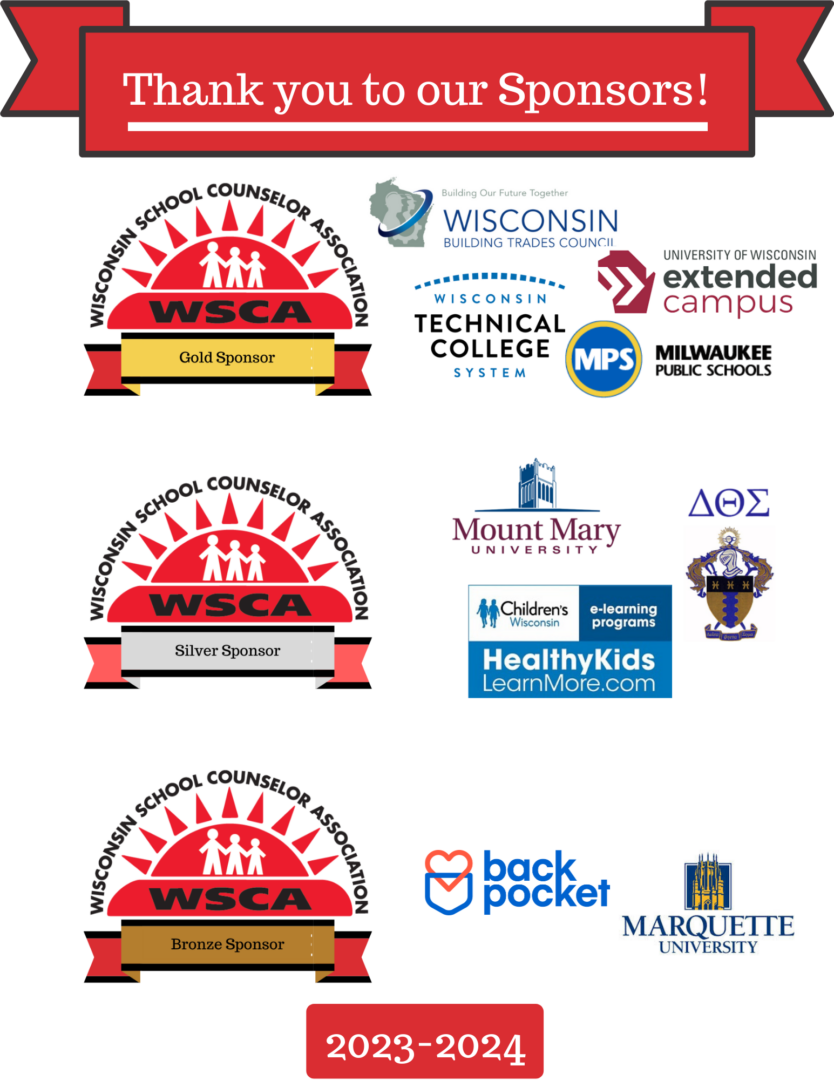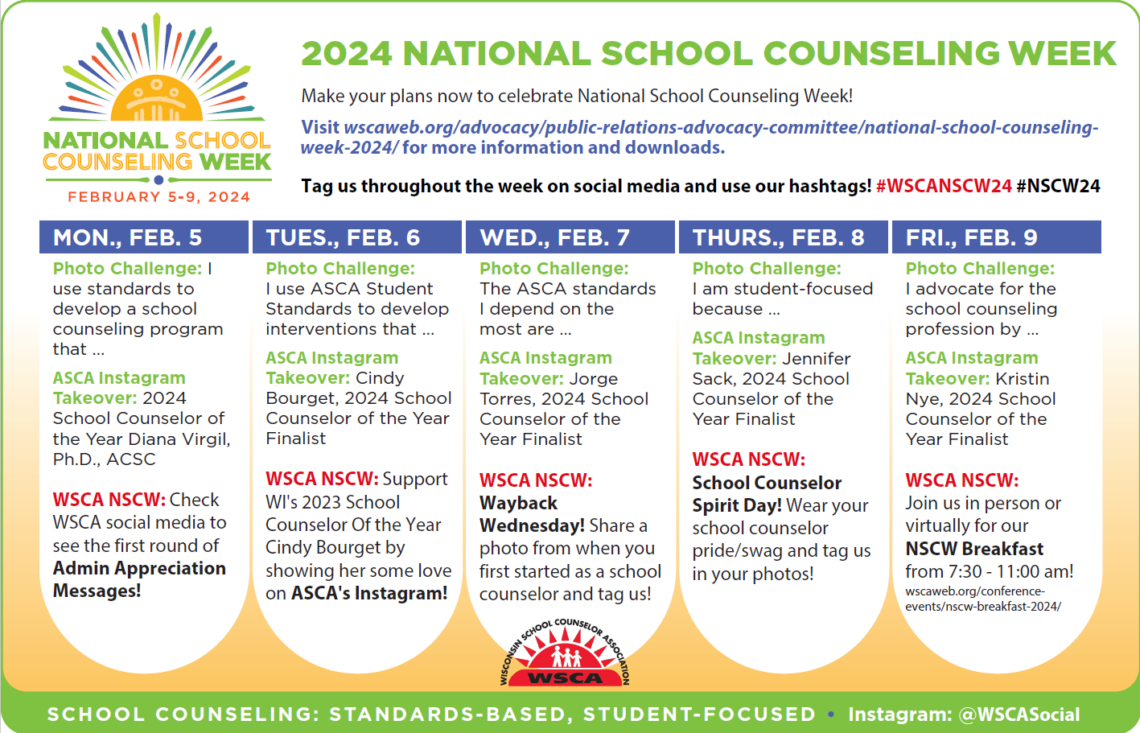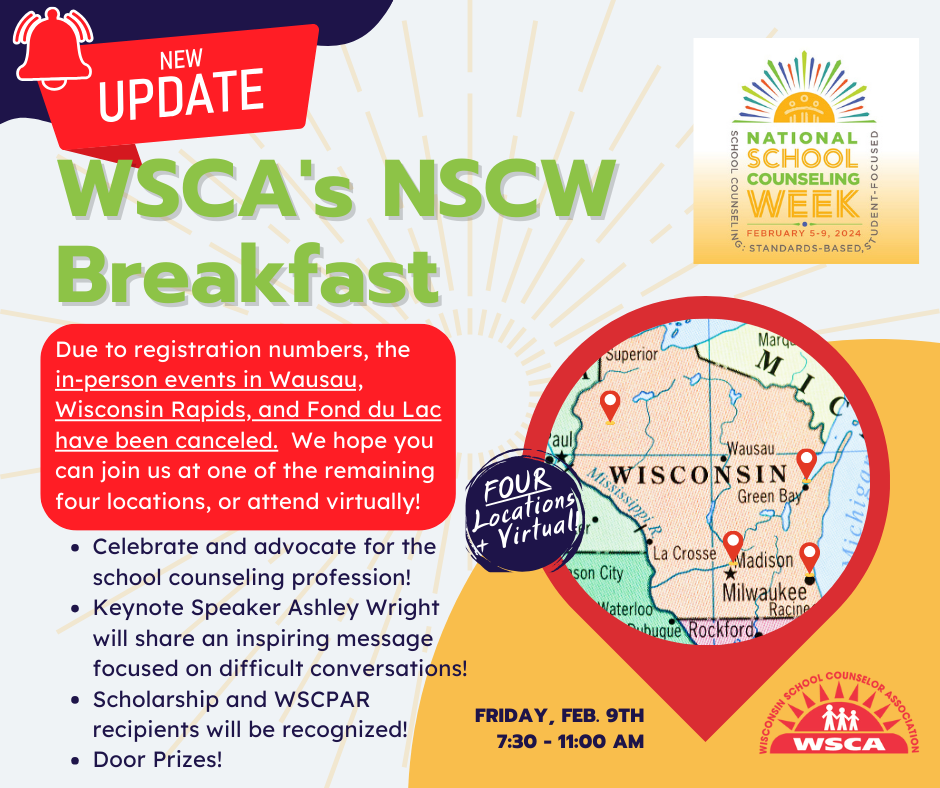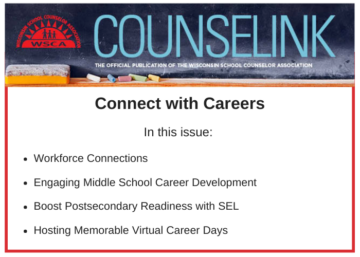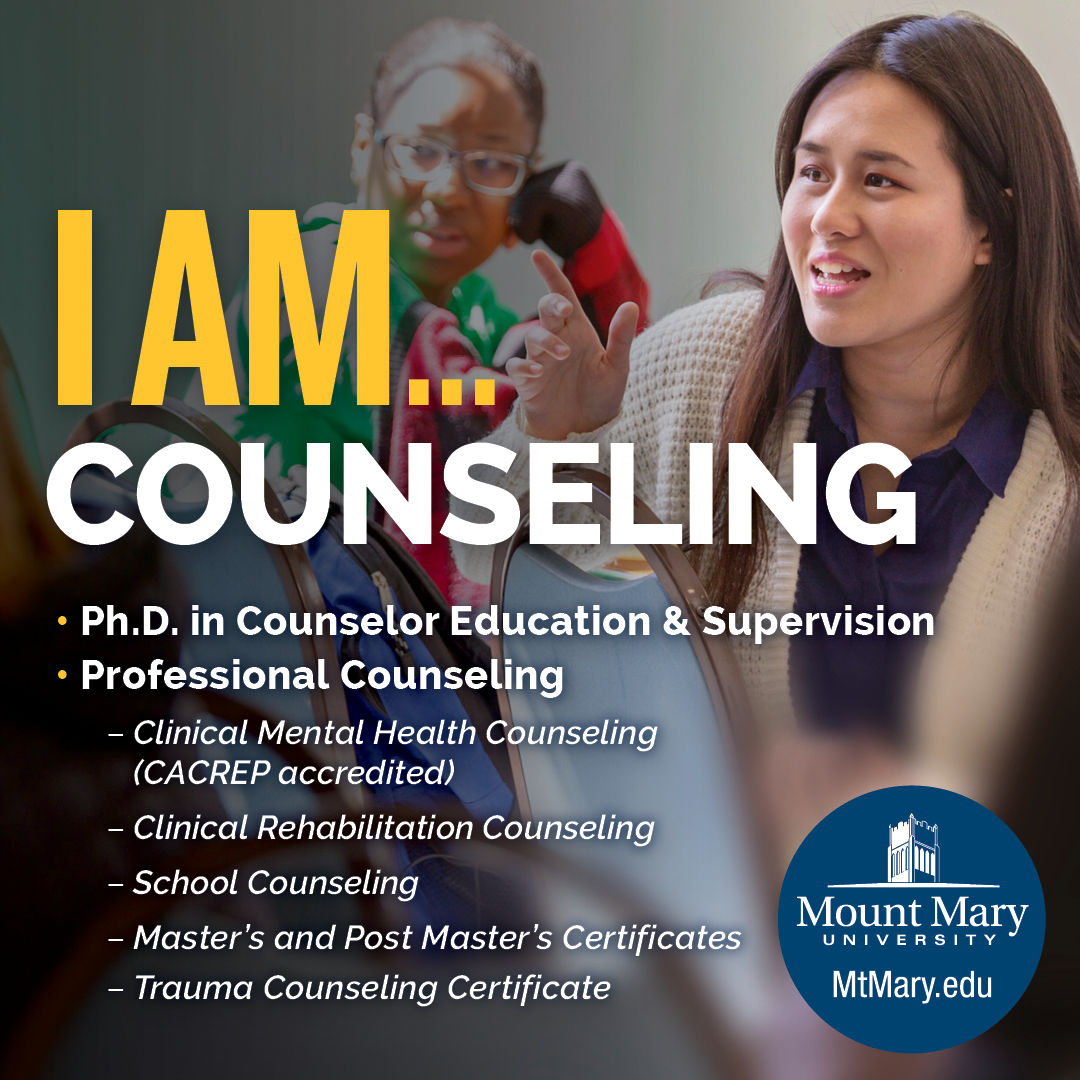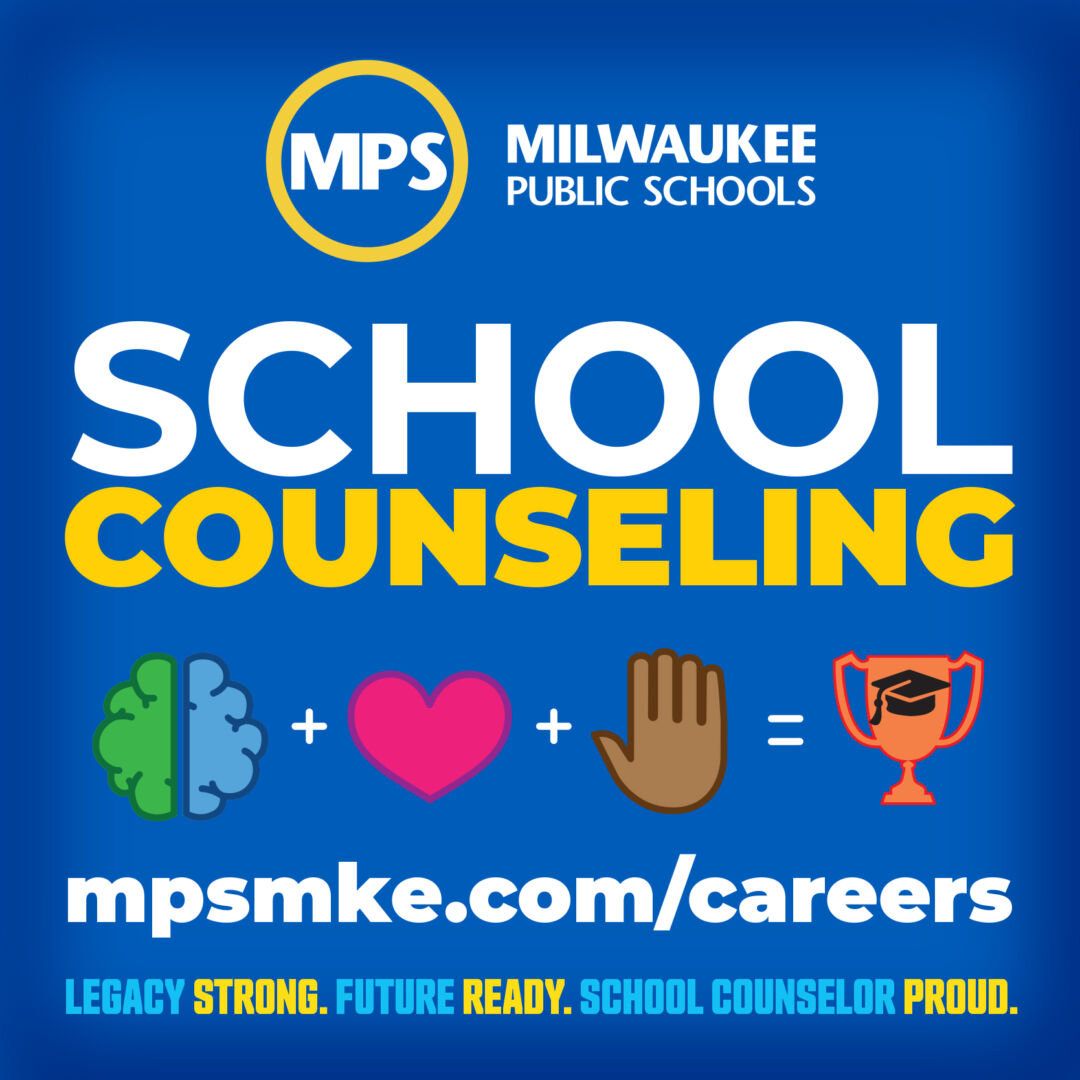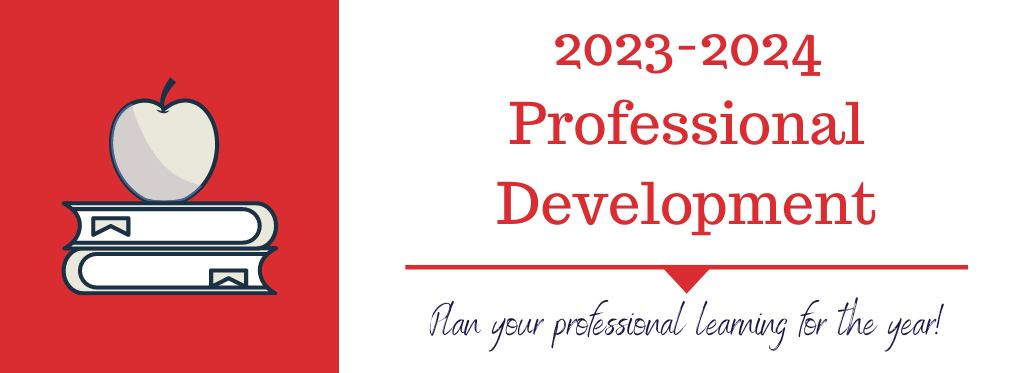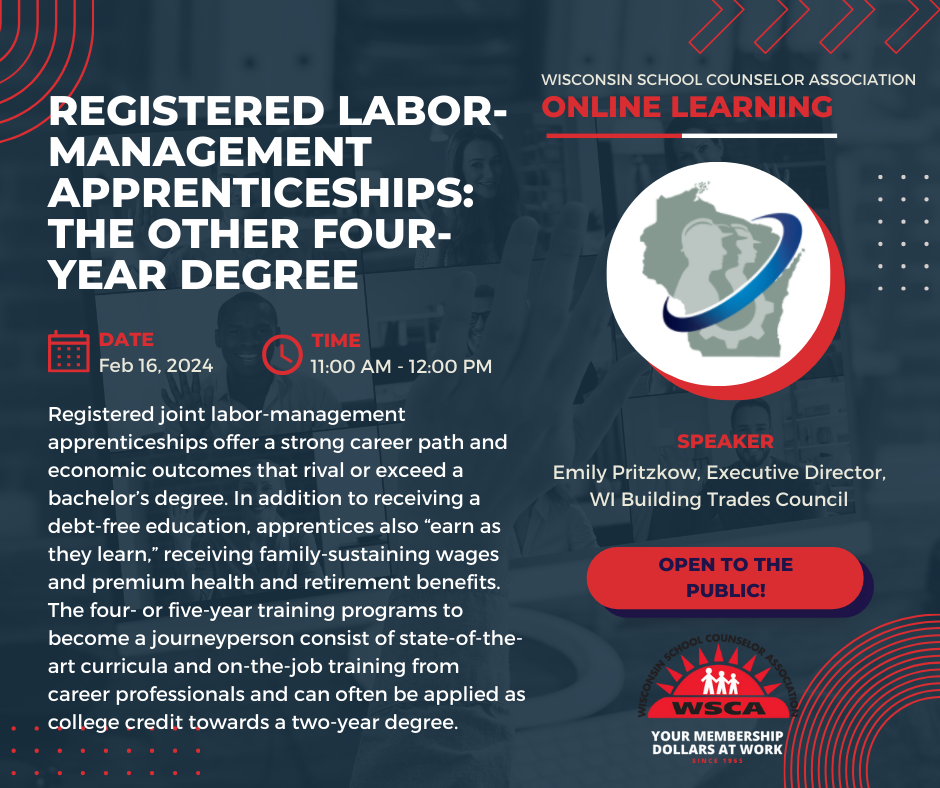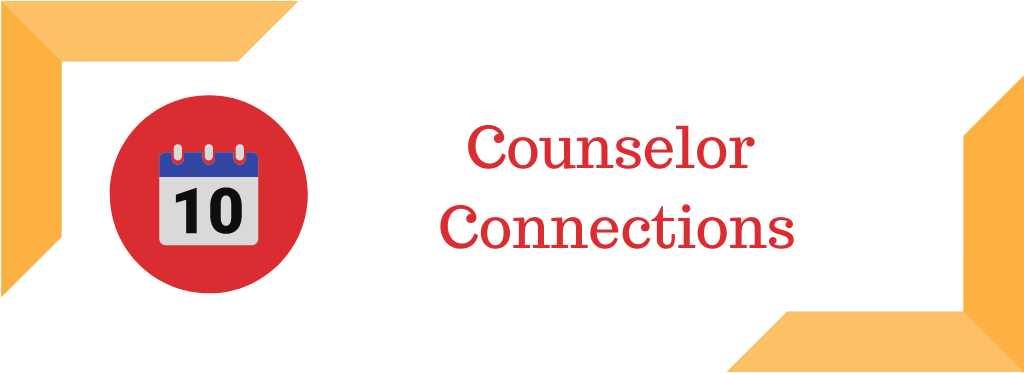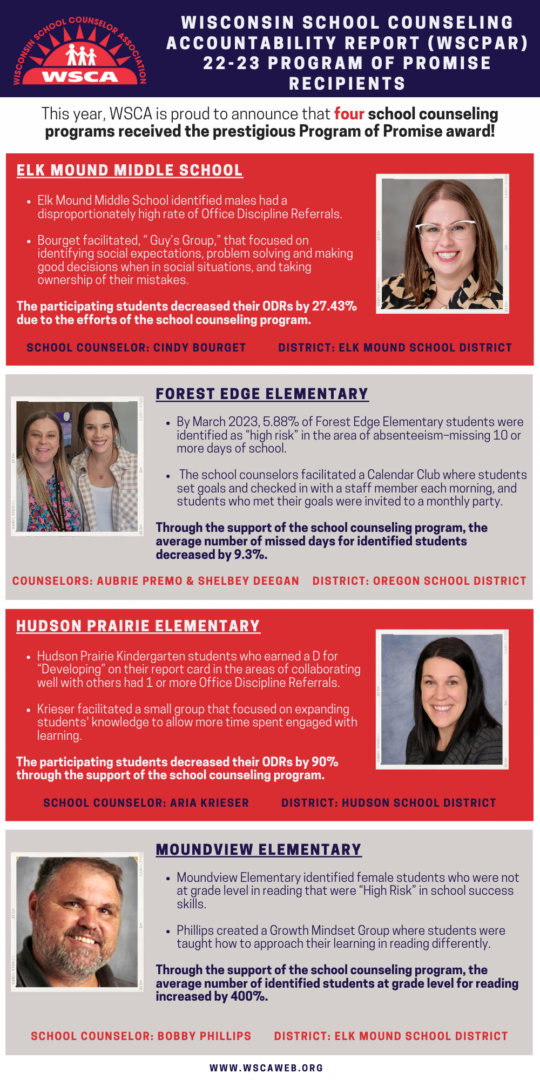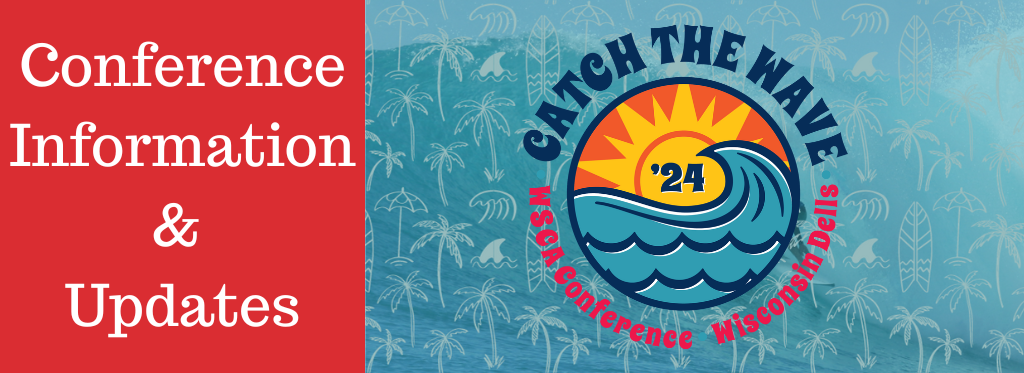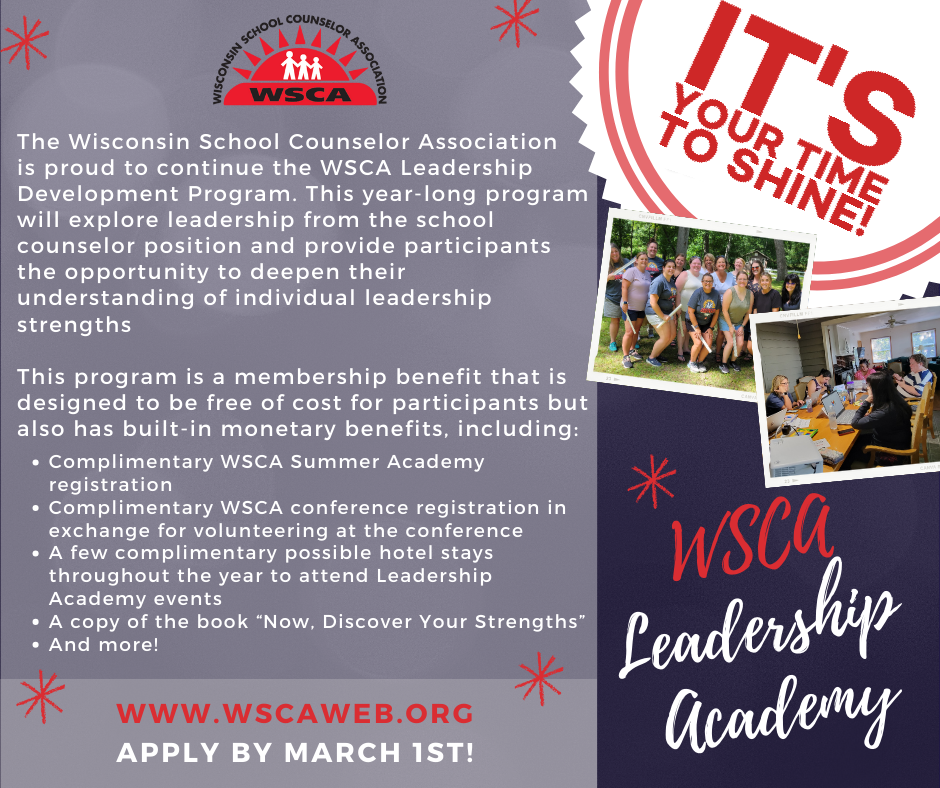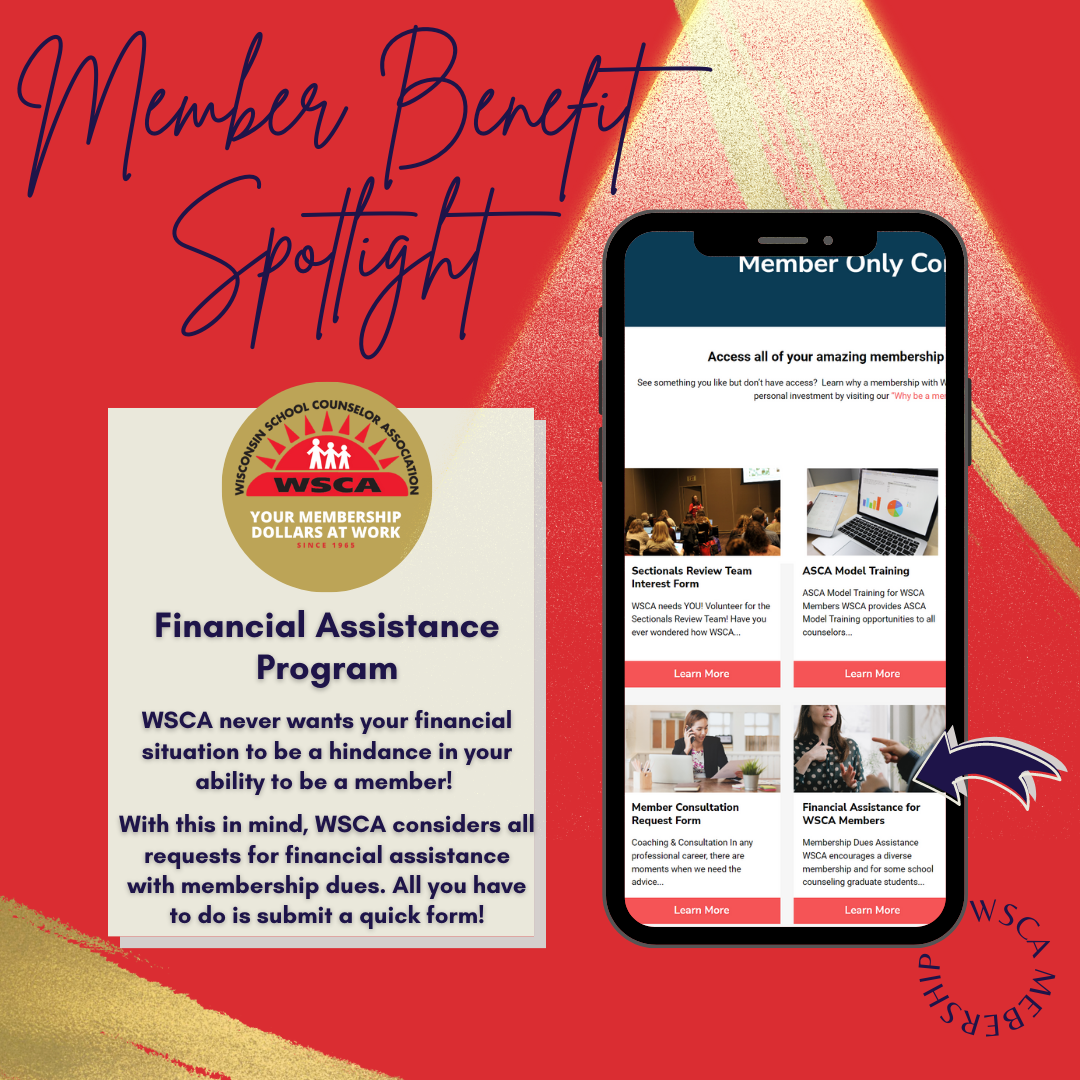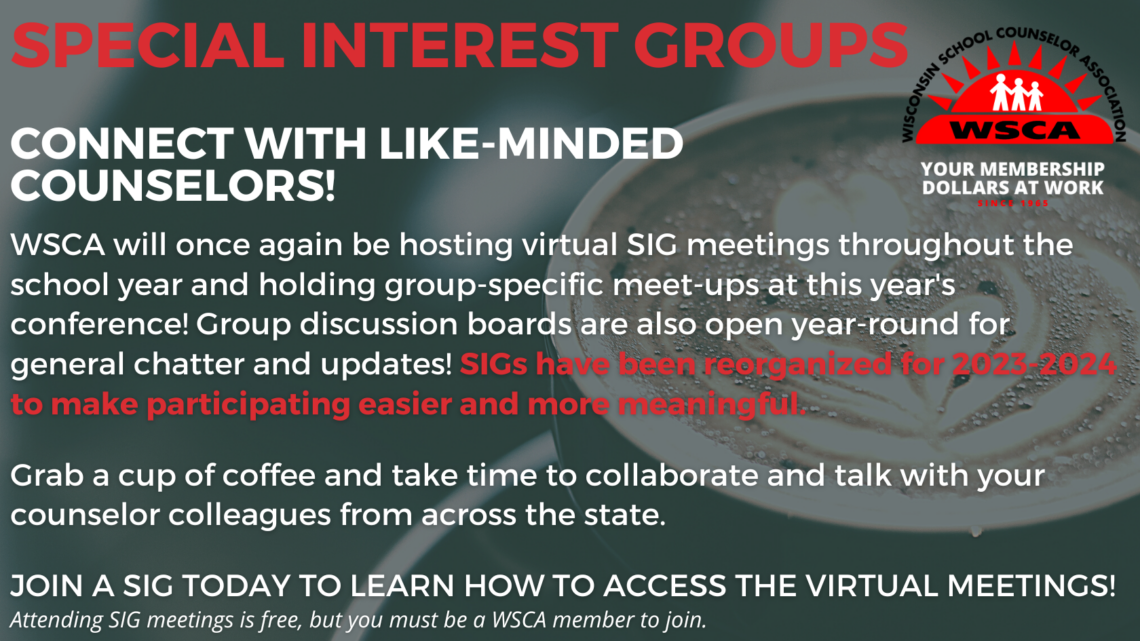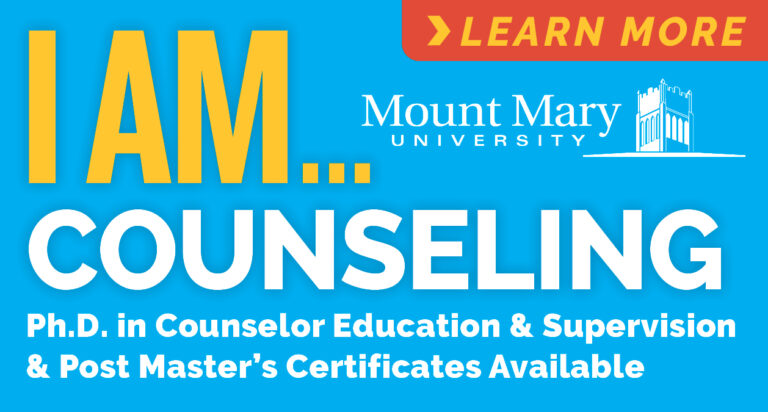February 2024

A Message from the WSCA Executive Director

Happy National School Counseling Week!
Woohoo, NSCW is one of my favorite weeks of the year! An entire week dedicated to just advocating for the profession of school counselors and our programs, what an opportunity.
Who knows your counseling program better than you? How often are you sharing what you do with your counseling program? Who would you like to have a better understanding of your role? NSCW is the perfect opportunity for you to be loud and proud about how your program supports students in your school community.
Don’t get overwhelmed or worried about having to spend an exorbitant amount of time or money on fancy, crafty, elaborate displays for NSCW. Start small and keep it manageable for you; advocacy looks different from counselor to counselor; however, we all need to take this state and nationally-recognized time to spread the word about the amazing work you do. Looking for some easy ideas, check out resources on our website: https://www.wscaweb.org/advocacy/public-relations-advocacy-committee/national-school-counseling-week-2024/.
Let us show appreciation for you by joining us for NSCW activities across social media to have a chance to win some prizes. Spend time with like-minded colleagues at the WSCA NSCW breakfast on Friday.
Know you are valued, appreciated, and critical for student success! We can’t wait to celebrate all of you.
~Stacy Eslick
A Message from the WSCA Board of Directors

Happy 2024 WSCA! It is that time of the year when we ask our owners (WSCA membership) to vote for the slate of new Board of Directors candidates with a ‘yes’ or ‘no’ vote. If the membership votes are 85% for “yes,” the election for our three new Board Directors will be complete. The new Board Directors represent Wisconsin School Counselors for a three-year term. It is important to understand that the Board of Directors functions as owner representatives and servant leaders.
The Board of Directors met on Saturday, January 27, 2024, and approved the following slate. There are three Board positions open, and WSCA received several applications from dedicated school counselors. We look forward to your participation in voting for our slate of the Board of Directors candidates.
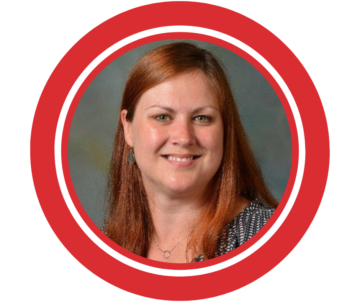
Board Of Directors Application Candidate: Jennifer Binneboese
Jennifer Binneboese has been a professional school counselor for 17 years. She currently works as a lead school counselor at Washington Park High School in the Racine Unified School District. When asked why she was interested in joining the WSCA board she stated:
“I am deeply motivated to serve as a WSCA Board Member because I passionately believe in the core mission articulated in the WSCA Global End Statement. Throughout my career as a school counseling leader, I have consistently integrated an equity lens into my practice, recognizing the profound impact it has on student success and well-being. I firmly believe that equitable access to educational opportunities is a fundamental right for every student, and as a WSCA Board Member, I am committed to advancing policies and initiatives that promote fairness, inclusivity, and justice in the field of school counseling.
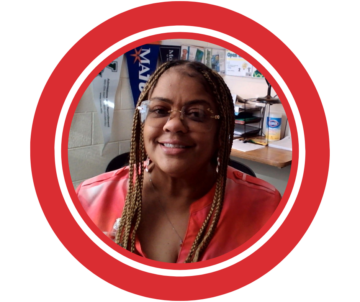 Board Of Directors Application Candidate: Vicki Cox-Clayborn
Board Of Directors Application Candidate: Vicki Cox-Clayborn
Vicki has been a professional school counselor for 11 years. She currently works as a school counselor at Wedgewood Middle School in the Milwaukee Public Schools. When asked why she wanted to serve on the WSCA board Vicki stated:
“I wish to serve on the WSCA Board of Directors to share my expertise, education, experiences, and skill-set with the Board. I understand each Board member is different, bringing a vast variety of interactions that have shaped and molded our perceptions and values. However, these differences are important to the authenticity and diversity that will make the Board unique. If selected to serve I will share my passions, and voice to uphold the ethics and values that have been embedded into my role as a school counselor leader. This ideology will help future leadership coordinate and align programs to promote offering access to all students, more specifically, subgroups to accommodate customized needs. If selected as a WSCA Board Member I will make a positive impact as I demonstrate how equity shapes my work as a school counselor leader, while effectively collaborating with the Board to contribute to the success of the school counselor’s role and WSCA mission.”
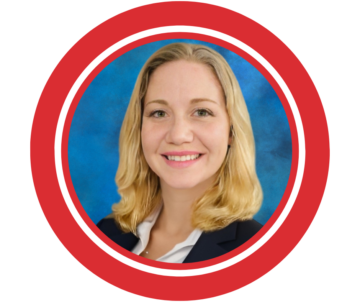 Board Of Directors Application Candidate: Miranda Howard
Board Of Directors Application Candidate: Miranda Howard
Miranda Howard has been a professional school counselor for 9 years. She is currently a school counselor at Birchwood Elementary School and Birchwood Public Montessori School, in the Birchwood Public School District. When asked why she was interested in joining the WSCA board she stated:
“I am interested in serving as a WSCA Board Member because I believe in continually advocating for the equity of all students. As an advisor of our Gender-Sexuality Alliance, as well as being a School Counselor in a very small, rural school district, I have seen the inequities that can easily fall upon marginalized groups. Our school district is also over 50 percent on free and reduced lunch, so we see many students trying to achieve an education while living in poverty. Our district also faces inequity in that we are a zero-aided school district, so essentially, we are property rich with lake homes, so our school district receives zero funding from the state, even though we still have many families living in poverty. I believe that it is incredibly important to address these inequities. My role as a school counselor is to provide our students with as many tools in order to achieve successful futures, and becoming a stronger voice and advocate for these students by sitting on the WSCA Board of Directors will help me to become a stronger leader in equity for all.”
DPI Connections
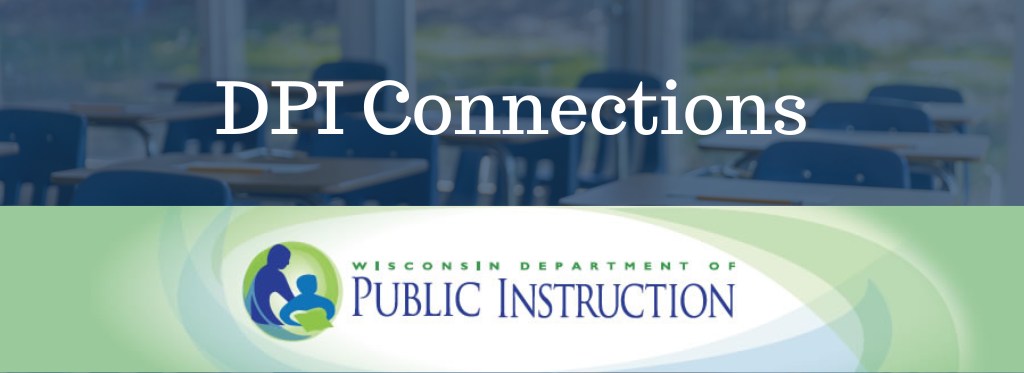
Truancy Prevention Learning Communities
In this collaboration between the Wisconsin Department of Children and Families (DCF) Youth Services Section and the Wisconsin Department of Public Instruction (DPI), learn from and connect with communities who are addressing attendance with best practice strategies. Each session will highlight promising practices and feature school district and county human service professionals from across the state of Wisconsin. Register for each session separately by clicking on the title link.
- Family Engagement Strategies on Wednesday, February 21, 2024, from 8:30-9:30 a.m.
- Using Data to Improve Attendance on Wednesday, March 6, 2024, from 8:30-9:30 a.m.
- School-County Collaboration on Tuesday, March 19, 2024, from 8:30-9:30 a.m.
Questions about these events can be sent to Julie.Incitti@dpi.wi.gov or DCFYJ@wisconsin.gov.
February is CTE Month!
Wanna make someone’s day? If you know a CTE teacher, coordinator, counselor, or administrator who goes above and beyond for CTE, click this link to give them a CTE Month shout-out! These special shout-outs will be published in the February edition of the CTE Newsroom and may be posted on DPI social media during CTE Month (Feb 2024). Do it now before you go back to that to-do list! The deadline to submit is February 6th!
If you’re looking for ways to promote CTE Month in your school community, be sure to check out the CTE Month Toolkit!
Navigating the DPI Website: Finding New or Timely SSPW Resources and Trainings
March 7, 9:15-9:45 am – Registration
Join in for a webinar to provide information on HOW TO NAVIGATE the DPI website and the SSPW webpages to find new or timely resources or training from SSPW.
Questions? Please contact Julie Incitti, julie.incitti@dpi.wi.gov

Feature Article – School Counselors: Champions of Career-Connected Learning and Lifelong Success
School Counselors: Champions of Career-Connected Learning and Lifelong Success
Karin Smith, ACP and Dual Enrollment Consultant, WI Department of Public Instruction
When Maria, a tenth grader who struggled in her math class, toured a local manufacturing company and met a female project manager, something clicked. Hearing how the manager uses math concepts like measurements, budgets, and scheduling made Maria realize how essential math is in industries like construction and manufacturing. After the company tour, Maria’s ears continued to perk up in her math class when her teacher explained how the equations she was learning could be used in a manufacturing job like a project manager. Maria was so inspired, she even applied for the Youth Apprenticeship Program in Production Operations and started researching manufacturing programs at her local technical college that could eventually lead to a four-year degree.
Maria’s story is a great example of how a teacher used an approach, called career-connected learning (CCL), to engage students in a new way. Career-connected learning, when applied in a classroom environment, combines academic content with students’ personal interests, supportive relationships, and future career opportunities (derived from https://clalliance.org/). As a result, academic motivation, skill development, and postsecondary preparedness all increase.
In addition, CCL creates more authentic touchpoints for your district’s academic and career planning (ACP) process and expands your scope and sequence of ACP activities. It can help increase student participation in your school’s career pathway programs. And, most importantly, CCL is key to realizing ACP’s original vision: To build a schoolwide culture of career readiness.
School counselors have an important role to play in bringing CCL to life in your district. Below are key ways you can champion CCL in your school and district.
Advocate and promote CCL with teachers and administrators using these key talking points:
- CCL facilitates exciting, relevant learning experiences that provide purpose and meaning to students.
- CCL develops academic, technical, and professional skills through real-world application.
- CCL showcases the relevance of school to life after graduation.
- CCL helps students discover passions and interests tied to future careers or community impact.
- CCL facilitates relationships with supportive peers, teachers, and community members.
Become a CCL leader by providing CCL professional development, coaching, and support.
Share CCL resources, strategies, and tools with educators. In particular, the soon-to-be released Wisconsin Career Readiness Standards will be a valuable resource for educators looking to incorporate career-connected learning into their classroom.
The future of learning must facilitate students’ interests in careers and community impact. As champions for every student, school counselors can help lead the way.
Want to learn more about career-connected learning? Contact Karin Smith, ACP and Dual Enrollment Consultant at the Wisconsin Department of Public Instruction at karin.smith@dpi.wi.gov.
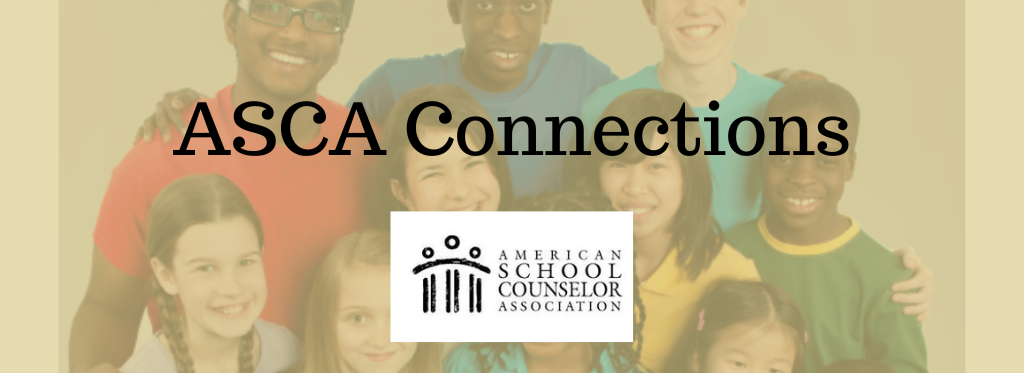
ASCA Connections
ASCA Position Statement Public Comment
The ASCA Position Statement Committee will be revising the following position statements. Please share any comments you have for the Position Statement Committee by Feb. 15, 2024.
WSCA Counselink: Connect with Careers
You Spoke, We Listened
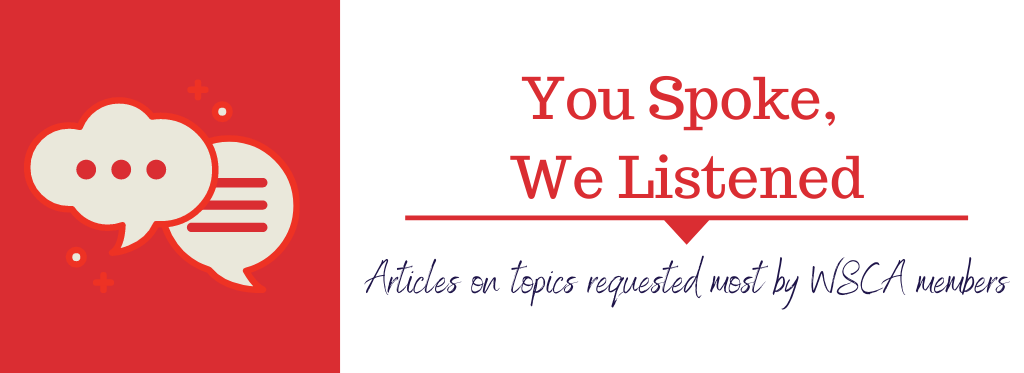
![]()
National Day of Racial Healing and Black History Month
The National Day of Racial Healing – always held the Tuesday after Martin Luther King, Jr. Day – centers around experiences rooted in truth-telling, offering people, organizations and communities a day set aside for racial healing, bringing people together to take collective action for a more just and equitable world. Click here for a Racial Healing Conversation Guide and view Dr. Carolyn Strong – National Day of Racial Healing, A Message to Allies.
February is Black History Month! The Library of Congress, National Archives and Records Administration, National Endowment for the Humanities, National Gallery of Art, National Park Service, Smithsonian Institution and United States Holocaust Memorial Museum join in paying tribute to the generations of African Americans who struggled with adversity to achieve full citizenship in American society. Learn more at https://blackhistorymonth.gov/.
National Museum of African American History and Culture (NMAAHC) Black History Month Digital Toolkit: Art as a Platform for Social Justice
PBS Wisconsin Education: 3 videos to watch for Black History Month
Black History Month Lessons & Resources from the NEA

![]()
100 Focused Attention Practices for the New Year!
By Dr. Lori Desautels (November 2024 WSCA Conference Opening Keynote Speaker)
These practices are created to prime and prepare our brains and bodies to hold a state of relaxed alertness. Focused Attention Practices calm and/ or energize the nervous system. They incorporate breath, movement, rhythm, visualization, music, and imagination which is sometimes challenging when we feel locked in a survival brain and body state. Many of these practices energize and help all of us to focus and pay attention to the present moment. Other practices calm the brain and body when we are feeling rough and dysregulated. These FoAP are as much for adults as they are for children and youth. There are a few that attend to younger ages, but feel free to modify and enhance them based on the ages of your student population. As a parent or caregiver, these practices can be implemented in our homes along with school settings.
As we prepare to problem solve, create, pay attention, and generate strong working memory and emotional regulation, through our executive function skills, we need to have a strong oxygenated glucose blood flow to the cortex, and these practices assist in this undertaking. They are to be implemented at the beginning of our days, throughout the day, and anytime we need closure and a reset. They are built into our procedures, routines, and transitions. Our hope is that the students will begin to lead and direct these once they notice how these practices calm their own bodies and clear their mind. Focused Attention Practices are a critical part of operationalizing Social and Emotional Learning.
![]()
FAFSA 2024-25 Walkthrough Video
This is a step-by-step video walkthrough of the 2024-2025 FAFSA (Free Application for Federal Student Aid) brought to you by the Utah System of Higher Education. You must complete the FAFSA in order to determine your eligibility for federal aid for college – including grants, work-study, and federal student loans. If you will be attending college in Fall 2024 or Spring 2025, this video will help you apply for financial aid.
Need a different language? Try YouTube’s translation caption feature by clicking the gear icon/settings button in the bottom right corner of the video, then click “subtitles”, then click “auto translate” and choose a language from the list!
This video moves quickly. We recommend the following: watch a section, pause, complete that section, and repeat until finished. Please note, we do our best to respond to comments throughout the workday (8am-5pm MT Monday-Friday), but if you need immediate or after-hours assistance, you can always call Federal Student Aid at 1-800-433-3243 or use their chat feature: https://studentaid.gov/help-center/answers/landing.
This video is brought to you by: Utah System of Higher Education and my529 (my529.org)
Legislative Updates
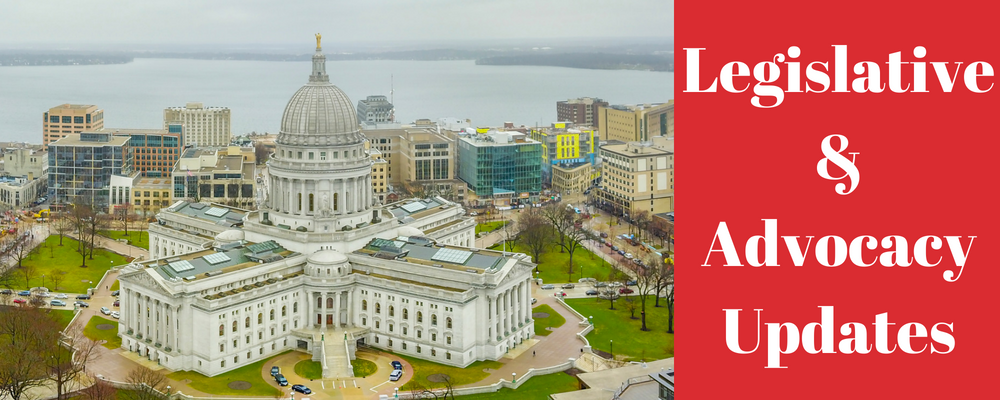
Legislative and Advocacy Updates for February 2024
The Wisconsin Senate and Assembly are winding down their legislative session. We encourage you to review them and contact your state elected officials with your input and feedback on how this will impact your students and schools.
Legislative Task Force Updates
Below are some of the proposals that have come out of legislative task forces. Please make a special note about the language in the truancy senate bill that proposes mandatory grade retention as well as mandatory physical activity timelines in the childhood obesity assembly bill.
Truancy Task Force
Six truancy bills were introduced in the assembly. It is anticipated that the committee will hear all six of those bills the week of February 5th.
- AB-1024 Truant Notice (Binsfeld, Amy) Notice to the parent or guardian of a habitually truant child. Referred to Assembly Education
- AB-1025 Truancy (Nedweski, Amanda) Definitions related to truancy. Referred to Assembly Education
- AB-1026 Grade Promotion (Binsfeld, Amy) Prohibiting grade promotion on the basis of absences from school. Referred to Assembly Education
- AB-1027 Truancy Grant Funding (Binsfeld, Amy) Funding a truancy reduction grant program and making an appropriation. Referred to Assembly Education
- AB-1028 Truancy Grants (Binsfeld, Amy) A truancy reduction grant program. Referred to Assembly Education
- AB-1029 Truancy Information (Melotik, Paul) Including truancy information in the school district and school accountability report. Referred to Assembly Education
Childhood Obesity Taskforce
Assembly Committee on Health, Aging and Long-Term Care AB1013-1016
Human Trafficking Taskforce
Assembly Committee on Criminal Justice and Public Safety AB974, AB976, AB978
Read more from WASB on how “Committees in both chambers will take action this week on over 30 bills affecting K-12 education”
Educator Shortage Updates
Wisconsin Retirement System: Proposed Changes to Retirees Ability to Work in WRS Organization After Retirement
Under current law, certain people who receive a retirement or disability annuity from the Wisconsin Retirement System (WRS) and who are hired by an employer that participates in the WRS must suspend that annuity and may not receive a WRS annuity payment until the person is no longer in a WRS-covered position. This suspension applies to a person who 1) has reached his or her normal retirement date; 2) is appointed to a position with a WRS-participating employer; and 3) is expected to work at least two-thirds of what is considered full-time employment by the Department of Employee Trust Funds.
This bill allows such a person, who is hired by a WRS employer as an employee or to provide employee services, to not suspend his or her annuity for up to 60 months. The bill also requires participating employers that hire such annuitants to make payments to ETF equal to what they would have paid as required contributions for each rehired annuitant if the rehired annuitant had suspended his or her annuity. Under the bill, these payments are deposited in the employer reserve account. If the person does not terminate the annuity and does not become an active WRS-participating employee, in the case of state employment, the person is not eligible for group insurance benefits provided to active WRS-participating employees and may not use any of his or her service in the new position for any WRS purposes. If the person opts to again become an active WRS-participating employee, the person is eligible for all group insurance benefits provided to other participating employees and may accumulate additional years of creditable service under the WRS for the new period of WRS-covered employment.
New! DWD rolls out teacher apprenticeship program.
Details are still being formulated, you can learn how this teacher apprenticeship program is a partnership with the Wisconsin Department of Public Instruction (DPI) and aligning with DPI licensing standards.
Launching a New Teacher Apprenticeship Pilot Program
“During his speech, Gov. Evers announced the creation of a pilot program for a new apprenticeship pathway in the field of education. Developed through a partnership of the Wisconsin Department of Public Instruction (DPI) and DWD, this new pilot program will build on Wisconsin’s apprenticeship models in other sectors and tried-and-true teacher apprenticeship models from other states. The pilot program will focus on student learning in a practicum setting and will allow students to earn a salary while developing their skills.
According to a 2023 report by the Wisconsin Policy Forum, the average annual teacher turnover rate from 2009 to 2023 was 11.5 percent, reaching an alarming 15.8 percent in the 2022-23 school year. The period studied included both the highest levels on record of teachers moving between districts and leaving the profession altogether. The report found that both rural and urban districts, districts with large populations of low-income students and students of color, and small school districts were the most impacted. Additionally, turnover was highest for teachers of color.
This new pilot program will help address issues in turnover and retention while also bolstering and strengthening the state’s educator pipeline by reducing barriers and encouraging more young people to enter the field. Traditional educator preparation programs can be expensive, as they often involve an unpaid internship (student teaching), which may be cost-prohibitive for low-income students, nontraditional students, or individuals looking to change careers. Additionally, providing mentorship opportunities to teachers beginning their careers has been proven to help with retention. The apprenticeship model includes built-in mentorship during the program and will help new educators build networks of support and professional learning.
As part of the pilot program, participants will begin working as apprentices in Fall 2024. Individuals participating in the new pilot program will:
- be employed and paid by a school district participating in the apprenticeship program;
- begin the program by enrolling in a 2-year associate degree program;
- work with a mentor and cooperating teacher;
- build on on-the-job skill training with relevant coursework;
- complete an approved Educator Preparation Program; and
- apply for a full teaching license (Tier II).
Wisconsin Apprenticeship pairs structured, on-the-job training with classroom instruction, allowing apprentices to be paid to “earn as they learn.” Wisconsin was the first in the nation with a registered apprenticeship program and is unique among the 50 states in requiring employers to pay their apprentices for both time worked and time spent in required classroom instruction. This recognizes the importance of a dual training system that combines skills obtained on the job site with technical knowledge in the classroom.
Wisconsin has more than 200 apprenticeship occupations with over 2,600 employers. While traditional trade apprenticeships continue to be strong, emerging employment sectors and occupations, including healthcare, are building the depth of offerings and growing apprenticeship opportunities.”
UW–Madison School of Education Wisconsin Teacher Pledge Program
The School of Education Teacher Pledge Program pledges to pay the equivalent of in-state tuition and fees, testing, and licensing costs for all our teacher education students. In return, you pledge to work at a Wisconsin PK-12 school for three to four years after graduation.



